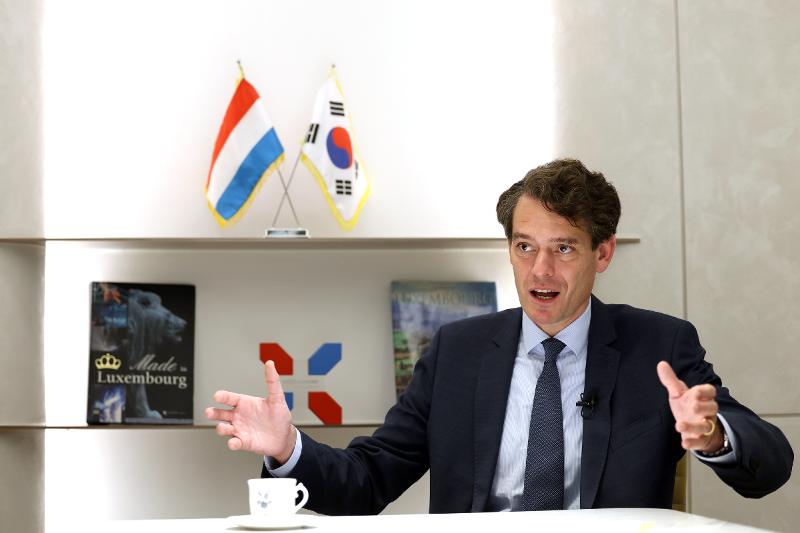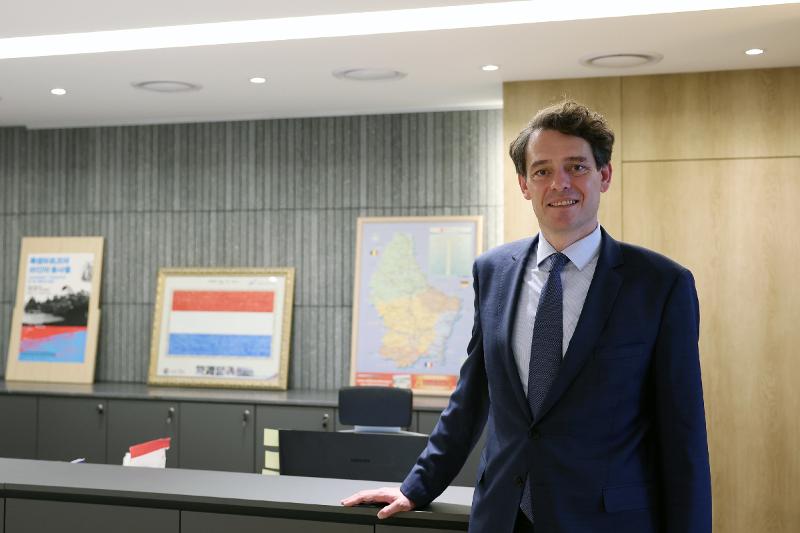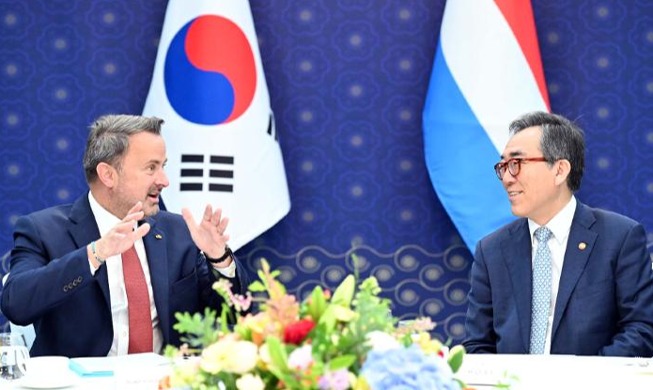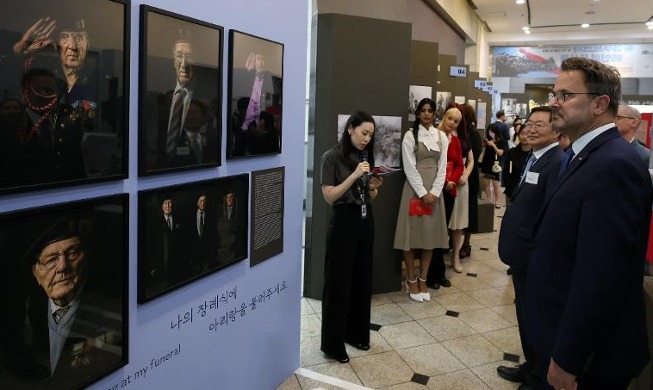
Jacques Flies, the inaugural Luxembourg ambassador to Korea, on July 15 tells Korea.net at his embassy in Seoul that the exchange of diplomatic missions between the two countries this year stemmed from their joint commitment to deepen bilateral friendship and partnership.
By Yoon Sojung
Photos = Jeon Han
Video = Lee Jun Young and Park Daejin
"The demonstration of our commitment to deepen friendship and partnership."
This is what Luxembourg Ambassador to Korea Jacques Flies said when asked about the significance of both countries exchanging embassies this year.
Bilateral relations, which have developed in all sectors since diplomatic ties were formed in 1962, are rooted in Luxembourg's participation in the 1950-53 Korean War, he said. His country's veterans who fought in the war and still care about Korea form a bond that will never cease, he added.
Studying Korean at the Luxembourg branch of King Sejong Institute, the diplomat mentioned the high popularity of Hallyu (Korean Wave) in his country as well as rising interest there in traditional culture and the Korean language. As the inaugural ambassador of Luxembourg to Korea, he said he will do his best to promote bilateral cooperation in all areas including politics, business and culture.
The following are excerpts from the July 15 interview with him at his embassy in Seoul's Jung-gu District.
Congratulations on your embassy's opening in Seoul. What made both sides exchange embassies this year?
Since the establishment of diplomatic ties in 1962, both countries have continued to develop bilateral cooperation in many areas. The roots of bilateral ties lie in Luxembourg's participation in the Korean War to protect peace on the Korean Peninsula. Korea is a likeminded partner in the Indo-Pacific region. Exchanging embassies demonstrated our commitment to deepen our friendship and partnership in this regard.
Many Korean companies operate in Luxembourg and bilateral investment is growing. What is behind this brisk business and trade activity?
Luxembourg is an ideal location for Korea to do business in Europe, as we can provide all necessary conditions and support. Luxembourg is an innovation-centered economy and holds a strategic place in European business because we have good connectivity to neighboring countries and are multilingual and cross-cultural. We serve as a test bed for any technology goods or services that become commercialized in the European Union.
Our finance center is a world leader. Earlier this year, the Korea Development Bank listed a bond worth USD 3 billion on Luxembourg's stock exchange, the first in 20 years. If we work together, it will be win-win for both sides.
In what areas does Luxembourg wish to boost cooperation with Korea?
I would firstly say politics as we both support democracy and a rule-based international order. We have well-established economic cooperation but still have growth potential. In science and culture, I hope more universities and research centers of both countries can collaborate. In people-to-people exchange, in particular, both countries signed a working holiday agreement earlier this month, and I wish it can broaden human exchanges such as for youth.
What global issues like climate change, human rights or the global economy can both sides cooperate in?
We can work together in all areas. In politics, both countries support democracy, follow the rule-based international order and cooperate under the United Nations (U.N.) Charter. Considering today's international politics, such cooperation holds more significance. Russia's illegal aggression against Ukraine not only poses a threat to Ukraine but also Europe, Korea and the international order in general. Russia's violation of a U.N. Security Council resolution and its decision to deepen cooperation with North Korea is also another big threat to peace and security of the Korean Peninsula.
Joining the U.N. Command is also on the table and something we need to discuss with the Korean government. It is our commitment to underscore our will to contribute to peace on the Korean Peninsula. As both of us are advanced economies, I believe we can also cooperate in joint responses to the climate crisis.
In January last year, a Belgian-Luxembourg unit was named Korean War of the month by the Korean government. How have both sides preserved the legacy of Luxembourg's participation in the conflict?
I witnessed how the Korean government, Ministry of Patriots and Veterans Affairs, and Korean society in general commemorate the legacy of participation in the conflict. I appreciate Seoul's policy toward surviving war veterans and their descendants. Over the last 10-15 years in Luxembourg, there's been renewed interest in the 85 Luxembourg men who volunteered to fight in the Korean War.
In partnership with the National Museum of Military History Luxembourg, the War Memorial of Korea in Seoul is hosting a special exhibition on the stories of these war heroes, and this is another testimony to mark their legacy. The exhibition introduces the late war veteran Gilbert Hauffels, who requested that the folk song "Arirang" be played at his funeral. Such attachment of war veterans who cared for Korea forms the bond between both countries that will never cease.
How does Luxembourg see Seoul's efforts to secure peace and a nuclear-free Korean Peninsula?
We support the Korean government's efforts to secure peace and the denuclearization of the Korean Peninsula. However, we condemn North Korea's repeated provocations of ballistic missile firing and strengthened military cooperation with Russia. We also express concern over Russia's veto of a U.N. renewal of a panel of experts monitoring the North's compliance with international sanctions and whose activities ended after 14 years. As a permanent member of the U.N. Security Council, Russia is required to protect the international order but threatens peace and security and undermines multilateralism.
How would you compare culture in Luxembourg and Korea? What can both sides learn from and share with each other?
I learned Korean at King Sejong Institute in Luxembourg. There, the popularity of Hallyu like K-pop and K-drama is amazing, and recently, more people show interest in traditional Korean culture and the language.
I would say diversity and openness are the two traits of Luxembourg culture. Immigrants play a large part in Luxembourg. About 48% of the population are from around the world who play a leading role in the country's development. Recently, the population is growing thanks to immigration.
When people migrate from many countries like Portugal or Italy, they bring their own cultures. By doing so, cultural diversity is built to form unique cultural development in Luxembourg. You can see cultures from many countries in every corner. They even joke about it by saying you can travel the world simply by taking a walk on the weekend in Luxembourg. Visit the country anytime to experience such charms.
You assumed your post in April this year. What is your goal while serving here?
After being in Seoul for more than six months, I find it a very dynamic city. As the first ambassador of my country to Korea, I wish to expand awareness of Luxembourg in Korea. In the past, we had a Trade and Investment Office in Seoul to assist bilateral cooperation. Now through the embassy, I want to expand such cooperation in all areas including politics, business, science and culture. I also wish to work more on projects to commemorate war veterans.

Jacques Files, the inaugural Luxembourg ambassador to Korea, on July 15 poses for photos at his embassy in Seoul's Jung-gu District. He said he wishes to strengthen bilateral cooperation in all sectors.
arete@korea.kr

